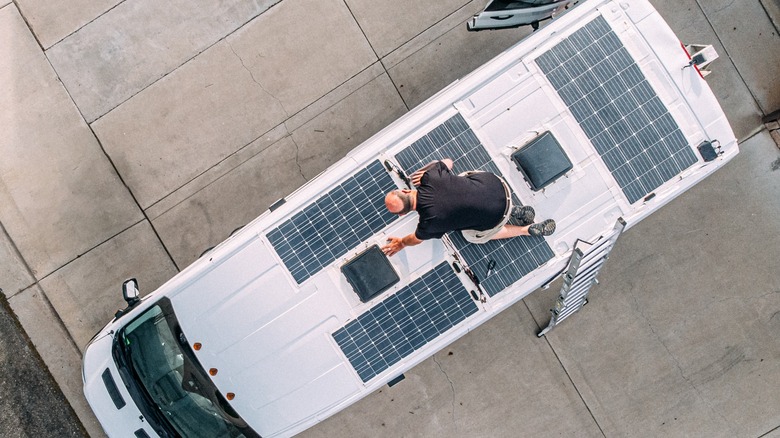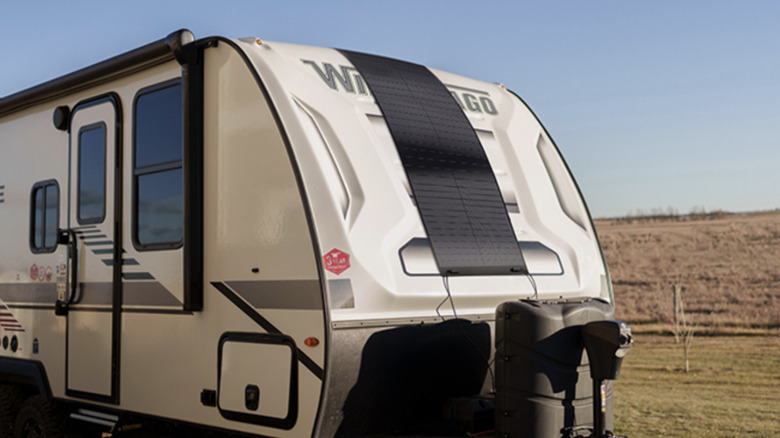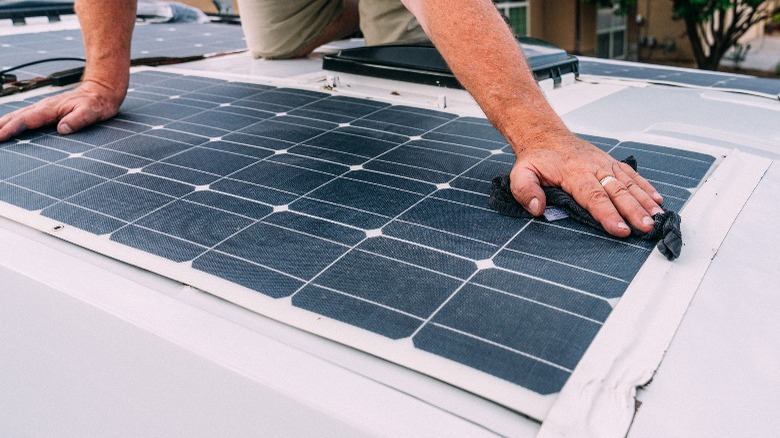Flexible Solar Panels For RV: Are They Effective And Will They Last?
If you see a solar-powered RV or a van, you're bound to notice panels installed on the roof or even lying down on the ground pointed at the sun. There are several different solar panels that are perfect for RVs that are either the standard rigid style or the more lightweight flexible panels. However, you may feel a bit hesitant to invest in flexible panels. How durable can they be with the ability to bend up to 240 degrees without breaking?
Flexible solar panels can withstand harsh elements from massive snow loads to extreme winds. Additionally, if you have one screwed to a standup frame on the ground, you won't have to worry about them flipping over and cracking on a sharp rock like the heavier panels. That doesn't mean they're indestructible, though. It is advised not to walk on them or bend them more than the suggested amount because it can cause a crack in a solar cell. However, they are fairly easy to install on your RV roof. But compared to the well-known rigid panels, how effective are flexible panels and what is their lifespan?
Flexible solar panels: are they worth it?
Flexible solar panels do have a place in the alternative energy market, and many reliable companies like Renogy, Rich Solar, and Sun Power have produced some highly rated flexible solar panels that are perfect for camping and other uses. The most efficient solar panels will be made of monocrystalline cells, which means the whole panel is one microscopic structure. This allows the panels to have higher energy conversion efficiency making them more effective than its cheaper multicrystal structure counterpart, polycrystalline.
Additionally, how the flexible panel gets installed on your roof will determine efficiency. Many flexible panels tend to have higher heat tolerance than rigid panels, so you don't have to leave space underneath to dissipate the heat. However, just because you don't have to doesn't mean you shouldn't. According to Renogy, if you place a spacer or two under the panel for breathing room, it may increase the panels' efficiency.
The question is how well do they work? They are not as efficient as rigid solar panels, which typically come with a higher rated power output. However, that doesn't mean you won't get use out of them. From experience with a Renogy 100 Watt Monocrystalline Flexible Solar Panel installed on the roof of a camper, during peak hours of a cloudless, cool day in Arizona when the sun is shining directly overhead, the panel has taken in around 65 watts of power. Considering solar panels are known to only produce about 75% of their rated power, that's not too bad.
Flexible solar panels can last years if you take care of them
The lifespan of a flexible solar panel is not as long as a rigid panel, which can get over 40 years of use if properly taken care of. However, that doesn't mean that flexible panels don't last. Typically, they can last around 15 to 20 years.
The good news is flexible solar panels are a lot more low maintenance than rigid panels. However, you still need to care for them to ensure that they last. Of course, cleaning them is a necessity. Renogy recommends washing them once a year, but if you're finding yourself in areas with high pollen, dirt, and debris flying around, you may want to consider cleaning them more often. You can use soap and water to get the dirt off. Just don't use an abrasive cleaning sponge, so you don't scratch the panels' surfaces.
It is also suggested that you watch where you are driving if the panels are installed on your roof. If there are any low-hanging tree branches, they can easily hook under the solar connector cables coming out of the junction box and rip them out. Additionally, keep an eye on these same connectors for any weather damage or even typical wear and tear. If you're constantly moving your ground panels around, the cables will get more worn as time goes on. From experience, some wires have begun to expose through where the connectors meet. Electrical tape has helped to keep them secure, but it's always a good idea to have extra connectors and cables on hand for replacements.


